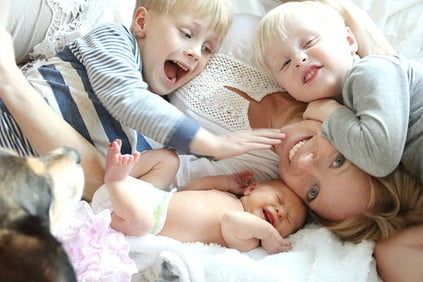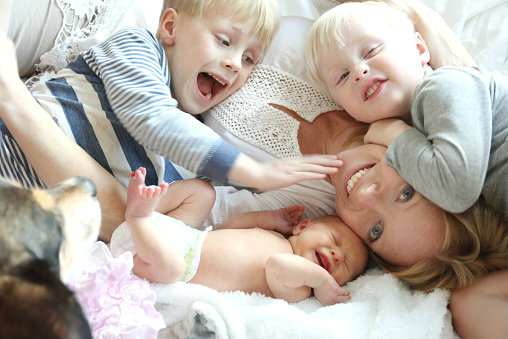 The arrival of a new baby is typically a joyful occasion, but the newborn also causes family routines to change and requires plenty of attention from the parents. These changes can be confusing for your other children and can trigger feelings of jealousy when they temporarily receive less attention than before. What can you do?
The arrival of a new baby is typically a joyful occasion, but the newborn also causes family routines to change and requires plenty of attention from the parents. These changes can be confusing for your other children and can trigger feelings of jealousy when they temporarily receive less attention than before. What can you do?
While Pregnant
Focus on sharing information in an age-appropriate way. If you have a preschooler, as just one example, he or she may not understand what it means that a new baby will arrive in six more months, because the concept of time may not yet be clear. Instead, try to say, “The baby will arrive around Christmastime, when it’s cold outside,” or “We’ll have our new baby when it’s summertime.”
How many details should you share? It depends on your comfort level and your child’s level of maturity, but KidsHealth.org suggests that you follow your child’s lead as much as possible and offers these tips:
“If your child shows more interest in the baby, you can encourage that by:
- going through your child's baby pictures
- reading books about childbirth (make sure they're age-appropriate)
- visiting friends who have infants
- packing a bag for the hospital
- thinking of potential baby names
- going to the doctor to hear the baby's heartbeat”
You can also ask the hospital if sibling birth classes are available and then determine if that makes sense for your family.
VeryWell.com suggests that you pull out baby albums from when your other children were infants. Compliment the pictures (“How cute!”) and share how much fun it is to have a baby in the house.
The Mayo Clinic suggests that you talk to your older children about your expanding abdomen (in age-appropriate ways) and request help in setting up a nursery. Explain that the new baby will mostly eat and sleep—and cry—and that it will take a while for this new sibling to become a playmate. If you will need to move a child out of a crib or room to rearrange space to make room for the baby, do so ahead of time so your older child has time to adjust to the new arrangement, pre-birth. If possible, complete toilet training of any child in that stage of development—or wait until the newborn is a few months old before starting any toilet training.
The Baby Arrives!
It isn’t unusual for older children to act out when the baby arrives as a way to get parental attention. The Mayo Clinic recommends that you try to circumvent that by praising your older children whenever they are behaving well and ignoring behavior—if possible—when you suspect that it’s an attention-getting ploy. The idea is to encourage appropriate behavior and to discourage inappropriate actions. Ask your children how they feel about having a new baby in the house and genuinely listen to responses. If a child reverts in behavior, perhaps by having toilet accidents after already being trained, this is a sign that he or she could use more reassurance.
Looking for more ways to enrich your child’s life? Horizon Education Center provides affordable quality care, including educational and enrichment opportunities for children in the following Northeast Ohio locations.







